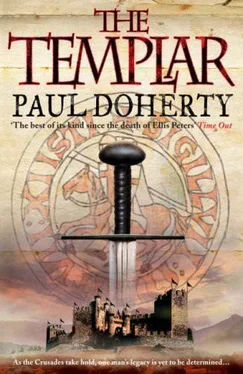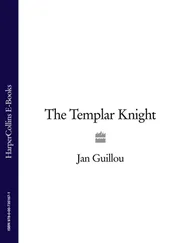P. Doherty - The Templar
Здесь есть возможность читать онлайн «P. Doherty - The Templar» весь текст электронной книги совершенно бесплатно (целиком полную версию без сокращений). В некоторых случаях можно слушать аудио, скачать через торрент в формате fb2 и присутствует краткое содержание. Год выпуска: 2010, ISBN: 2010, Издательство: Minotaur Books, Жанр: Исторические приключения, на английском языке. Описание произведения, (предисловие) а так же отзывы посетителей доступны на портале библиотеки ЛибКат.
- Название:The Templar
- Автор:
- Издательство:Minotaur Books
- Жанр:
- Год:2010
- ISBN:9780312576837
- Рейтинг книги:5 / 5. Голосов: 1
-
Избранное:Добавить в избранное
- Отзывы:
-
Ваша оценка:
- 100
- 1
- 2
- 3
- 4
- 5
The Templar: краткое содержание, описание и аннотация
Предлагаем к чтению аннотацию, описание, краткое содержание или предисловие (зависит от того, что написал сам автор книги «The Templar»). Если вы не нашли необходимую информацию о книге — напишите в комментариях, мы постараемся отыскать её.
The Templar — читать онлайн бесплатно полную книгу (весь текст) целиком
Ниже представлен текст книги, разбитый по страницам. Система сохранения места последней прочитанной страницы, позволяет с удобством читать онлайн бесплатно книгу «The Templar», без необходимости каждый раз заново искать на чём Вы остановились. Поставьте закладку, и сможете в любой момент перейти на страницу, на которой закончили чтение.
Интервал:
Закладка:
In her turn, Eleanor studied Simeon out of the corner of her eye: his dark face, the neatly clipped and oiled beard and moustache, his bony body, long arms and slender fingers. Quite an elegant man, with his bracelets, the earring in the left earlobe and the loose dark green robes he wore with a white cord around the waist. Simeon was a born story-teller, Eleanor reflected, and that was what she needed. Others were writing chronicles, accounts and letters about what was happening, so why shouldn’t she continue hers with a little skilled help?
‘Write it down as I describe it,’ she said to Simeon.
He brought both hands together and bowed.
‘As you say, mistress-sister, so shall it be done!’ His liquid dark eyes were full of amusement, his face composed in a mask of mock servitude.
Ah well, Deus vult , and so it was, Eleanor reflected. They had left Constantinople, ferried across the Arm of St George in barges to begin their journey through Anatolia, the Sultanate of Rhum. From the start they had been shadowed by Turkish scouts. The Army of God were following the same path as Peter the Hermit’s horde, and the Turks had deliberately left the remains of the thousands they had slaughtered at Civetot and elsewhere as a grisly warning. Bits of rotting skeletons, decapitated heads, skulls on a row of poles, in spiked bushes, on rocky outcrops or around wells and waterholes glared ominously at them. The signs of such a great massacre dampened the ardour of some, though others grew fervent for revenge. The Army of God moved slowly in phalanxes, long lines of carts, horses, donkeys and camels. Alongside these trudged columns of men, women and children, baking under the strengthening sun. Their destination was the Turkish-held city of Nicea with its forbidding towers, huge gates and flaking yellow walls. An impregnable fortress, Nicea was defended on three sides by impressive fortifications and on the fourth by the Askanian lake. The Army of God, however, were in good spirits. They were well supplied with corn, wine, wheat and barley, whilst the route to Nicea was clearly marked along the rutted, tangled path by scouts who nailed up wooden or metal crosses.
In the main it was a pleasant journey. Eleanor had ridden in one of the carts, reflecting more on what she had learnt in Constantinople than what awaited them at Nicea. Norbert and Alberic had become friendlier, welcoming her as a true sister as if some invisible barrier had been miraculously removed; even Imogene, who tended to keep to herself, commented on that. For the rest, Eleanor wondered about the Fedawi and their threats. How could they be so close to Constantinople? Had they disguised themselves, blending in with the merchants or Turcopole mercenaries who swarmed everywhere? Theodore, in recognition of what they had told her, rather shyly gave Eleanor a small icon painted on wood, very similar to those images she had seen in Hagia Sophia, a reminder of the bond between them.
Eleanor could now understand Hugh’s enthusiasm, as well as the strict discipline imposed on the Poor Brethren of the Temple. They were marching to Jerusalem not just to recover the Holy Sepulchre but to discover proof of Christ’s Passion and Resurrection. According to Hugh, they must be victorious and purify themselves, in order to be worthy to receive such holy relics. Little wonder too about the secrecy. Relic-hunters like the Magus, whoever he might be, would murder for such religious objects, whilst the Fedawi would never allow entry to a place they had chosen as their own.
Eleanor, seated on the cart jolting along the trackway, wondered if the Beggars’ Company, marching a little ahead of them, could be a refuge for such outlaws. Beltran distrusted Jehan deeply and had warned her to be wary of that rogue and his coven. Indeed, since leaving Constantinople, Beltran had attached himself to Eleanor and Imogene, paying particular attention to the pretty widow. Like Theodore, he proved to be a genial companion who, by his own confession, had hardly left Provence, being steeped, as he put it, in all its wonders, particularly the poetry and songs of the south. He was not a knight but a serjeant, a nuncius or envoy, well placed to learn all the gossip of the camp and the bickering between its leaders.
After the long march they eventually reached Nicea. The Turks had withdrawn into the city to await any attack. Hugh took Eleanor to view the massive fortifications, the lofty yellow brick walls with more than a hundred towers all protected by a double ditch. Eleanor had scarcely returned to her tent when the cry ‘ Au secours! Au secours! ’ was raised. Warning horns and trumpets blared. She and Imogene hurried down the narrow gulleys between the pavilions leading to the centre of the camp. Here stood a huge cart, poles on each corner displaying the battle standards, containing a great wooden altar surmounted by a stark black cross. Two men, dressed like monks in long grey robes, stood with their backs to the cart wheels, swords and daggers drawn. They faced a threatening line of Frankish foot armed with lowered spears and pikes.
‘Spies! spies!’ a voice accused. ‘We caught them trying to leave camp with drawings and numbers.’ One of the trapped men raced forward, whirling sword and dagger, only to be stopped by a surge of pike thrusts that almost lifted him off the ground. He struggled like a landed fish, legs kicking, gargling on the blood spilling out of his mouth. The other immediately threw down his weapons and knelt, hands extended in a sign of surrender. He was swiftly seized, bound and dragged away. A short while later Hugh came hurrying back, even as the alarm was raised again: a blare of horns and trumpets, men shouting battle cries, war horses being quickly led out. He grasped Eleanor and pushed her inside the tent.
‘They were spies,’ he announced breathlessly, pausing as Beltran, Theodore and Godefroi thrust into the tent behind him. ‘The captured one has confessed. Kilij Arslan, Sultan of Rhum, is marching straight towards us with thousands of horsemen!’
‘Where, when will they attack?’
‘Bohemond besieges the northern side of Nicea, Godfrey of Bouillon the east and we the south, the same direction as Arslan. We will bear the brunt of the first attack.’
He had hardly finished when there was a surge of noise from outside, a renewed blowing of trumpets followed by screams and cries. They hastened out to see people pointing. Eleanor stared in horror at the hills behind the camp where the pine trees clustered close together like a green-black wall. Everyone was staring at them: boys and women collecting water in jars; a cluster of monks, Ave beads wrapped round their hands, gathering for the midday prayer; a cook, all bloodied to his elbows, a dead chicken dangling from his left hand; a young boy with a mongrel puppy in his hands; knights in linen undergarments, all gazing at the horror coming from the hills. Eleanor’s throat felt dry and narrow. She blinked and stared again. Hundreds if not thousands of horsemen, in flowing white robes, sunlight dancing off their helmets, were moving out of the trees like a flood of ants towards them. Already a dust haze was rising. The distant thunder of hooves shook the earth; coloured banners snapped in the breeze. Some children playing amongst the decaying stones of a cemetery laughed and shrieked, pointing their fingers.
‘They say they’ve brought ropes,’ Beltran murmured. ‘To bind us and lead us into captivity.’
The crowd could only stare. A monk began to chant a psalm: ‘ Domine libera nos — Lord deliver us.’
‘You pray,’ Hugh shouted. ‘The rest to arms, to arms!’ The menacing spell was broken. Jars were dropped, cloaks doffed, baskets placed on the ground, camp equipment pushed aside. Knights, serjeants, monks and priests, every able-bodied man, hurried to arm against that river of horsemen sweeping down to engulf them. For a short while the enemy disappeared into the tree-covered slopes, only to surge out again. The Turkish battle cries, a piercing, ululating screech, echoed shrilly above the drumming of hooves. The enemy’s coloured banners could now be clearly seen. The Turks reached the foot of the slope just as the Frankish line, knights in half-armour, on clumsily strapped saddles, burst out of the camp. The Frankish mounts were fresh, much heavier and moving at full charge. The Turks, bloodied on the pathetically armed mob of Peter the Hermit, were taken completely by surprise at the sheer fury of the Frankish attack. This only deepened as the phalanx of armour and heavy horse crashed into them like a fast-moving river hurtling up against some makeshift bridge. The Turks, on smaller, lighter mounts, were simply engulfed, then cut up into small groups, which had to face further Frankish attacks. The air rang with the horrid crash of battle, screams and yells. Banners floated down. The ground became strewn with white-garbed corpses. The Turks, not used to such violent hand-to-hand combat, simply broke, retreating up the slopes pursued by the exultant Franks. By now the news of this first skirmish was spreading through the Army of God. Normans, Rhinelanders, Flemings, French and Greeks flooded into Count Raymond’s camp. Eleanor watched them prepare, donning body armour, strapping on helmets. The mounted knights gathered, masked by a screen of dust and smoke deliberately created to blind the Turks already massing again on the tree-lined heights.
Читать дальшеИнтервал:
Закладка:
Похожие книги на «The Templar»
Представляем Вашему вниманию похожие книги на «The Templar» списком для выбора. Мы отобрали схожую по названию и смыслу литературу в надежде предоставить читателям больше вариантов отыскать новые, интересные, ещё непрочитанные произведения.
Обсуждение, отзывы о книге «The Templar» и просто собственные мнения читателей. Оставьте ваши комментарии, напишите, что Вы думаете о произведении, его смысле или главных героях. Укажите что конкретно понравилось, а что нет, и почему Вы так считаете.












